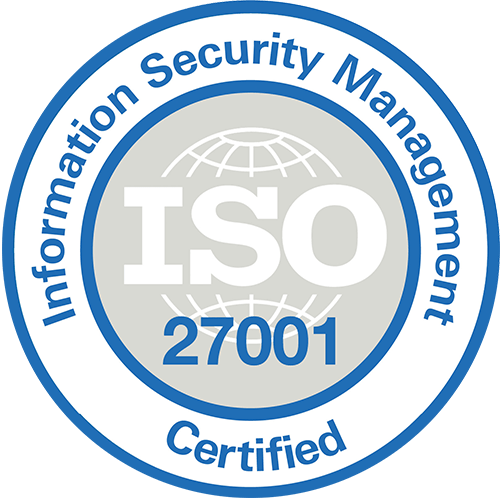ISO 27001 is an international standard for information security management systems (ISMS). It provides a systematic approach to managing sensitive company information, ensuring its confidentiality, integrity, and availability. ISO 27001 specifies the requirements for establishing, implementing, maintaining, and continuously improving an ISMS within the context of an organization's overall business risks.
Benefits of ISO 27001
Enhanced Information Security - ISO 27001 helps organizations establish a robust information security framework, reducing the risk of security breaches and unauthorized access to sensitive information.
Compliance with Regulations - ISO 27001 aligns organizations with various industry-specific regulations, legal requirements, and data protection laws, ensuring compliance and avoiding penalties.
Risk Management - ISO 27001 provides a structured risk management approach, enabling organizations to identify and mitigate information security risks effectively.
Customer and Stakeholder Confidence - Achieving ISO 27001 certification demonstrates a commitment to information security, building trust and confidence among customers, partners, and stakeholders.
Continuous Improvement - ISO 27001 promotes a culture of continual improvement in information security management, ensuring that security measures are regularly assessed and updated.

ISO 27001 Methodology The ISO 27001 methodology typically includes the following steps
-
Define the Scope
Determine the boundaries and extent of the ISMS implementation within the organization.
-
Perform a Risk Assessment
Identify and assess risks to the confidentiality, integrity, and availability of information assets.
-
Establish the ISMS Framework
Define policies, procedures, and controls to manage identified risks.
-
Implement Controls
Implement the necessary security controls and measures to address identified risks.
-
Monitor and Measure
Continuously monitor and measure the effectiveness of implemented controls and the overall performance of the ISMS.
-
Conduct Internal Audits
Regularly conduct internal audits to evaluate compliance with ISO 27001 requirements.
-
Management Review
Periodically review the ISMS performance and make necessary improvements based on the audit findings and changes in the organization's context.
ISO 27001 Process: The ISO 27001 process typically involves the following steps
- Assess the organization's current information security practices and compare them against the requirements of ISO 27001.
- Identify and evaluate information security risks, considering the likelihood and impact of potential threats and vulnerabilities.
- Develop and implement risk treatment plans to address identified risks through the implementation of appropriate controls.
- Prepare documentation, including policies, procedures, and guidelines, to establish and maintain the ISMS.
- Provide training and awareness programs to ensure employees understand their roles and responsibilities in information security.
- Conduct internal audits to assess the effectiveness of the ISMS and identify areas for improvement.
- Periodically review the ISMS performance and take necessary actions to address any non-conformities or areas for improvement.
ISO 27001 Pre-requisites
Some pre-requisites for ISO 27001 implementation include
1. Top Management Commitment - Support and commitment from senior management to implement and maintain the ISMS.
2. Resource Allocation - Adequate resources, including personnel, budget, and infrastructure, to support the implementation and operation of the ISMS.
3. Understanding of Information Assets - Awareness of the organization's information assets, their value, and their criticality.
4. Risk Management Approach - An established risk management framework to identify, assess, and treat information security risks.
5. Legal and Regulatory Compliance - Awareness of relevant legal and regulatory requirements pertaining to information security.
ISO 27001 Tools
There are various tools available to assist in the implementation and management of ISO 27001, including
1. ISO 27001 Documentation Toolkit - Provides pre-written templates and guidance for creating necessary documents and records required for ISO 27001 compliance.
2. Risk Assessment and Management Software - Tools that automate the risk assessment and treatment process, helping organizations manage information security risks effectively.
3. Compliance Management Software - Software solutions designed to streamline compliance with ISO 27001 requirements and assist in maintaining compliance over time.
4. Risk Management Approach - An established risk management framework to identify, assess, and treat information security risks.
5. Legal and Regulatory Compliance - Awareness of relevant legal and regulatory requirements pertaining to information security.

Team Certificate & Experience
- A proficient ISO 27001 implementation team may consist of individuals with certifications and experience in information security management. Some relevant certifications include There are various tools available to assist in the implementation and management of ISO 27001, including
1. Certified Information Systems Security Professional (CISSP)
2. Certified Information Security Manager (CISM)
3. ISO 27001 Lead Implementer/Lead Auditor
ISO 27001 Standards or Framework - ISO 27001 is the primary standard for information security management systems. It provides a framework for implementing and maintaining an ISMS. It is complemented by other ISO standards, such as ISO 27002 (code of practice for information security controls) and ISO 27005 (risk management for information security).
ISO 27001 Checklist: A typical ISO 27001 checklist includes items such as
1. Management commitment and leadership
2. Risk assessment and treatment
3. Information security policies and procedures
4. Human resource security
5. Asset management
6. Access control
7. Crypography
8. Physical and environmental security
9. Incident management
10. Business continuity management
11. Compliance with legal and regulatory requirements
12. Supplier relationships
ISO 27001 Reporting & Recommendations - ISO 27001 reporting typically includes
Statement of Applicability
Documenting the scope of the ISMS and the security controls implemented.
Risk Assessment Report
Detailing the identified risks, their impacts, and the recommended treatment measures.
Non-conformities and Corrective Actions
Reporting any non-conformities identified during internal audits and the corresponding corrective actions taken or planned.
Management Review Reports
Summarizing the performance of the ISMS, including achievements, improvements, and areas for further attention.




